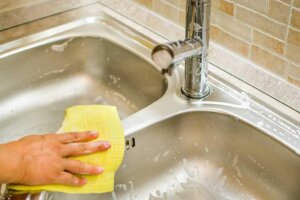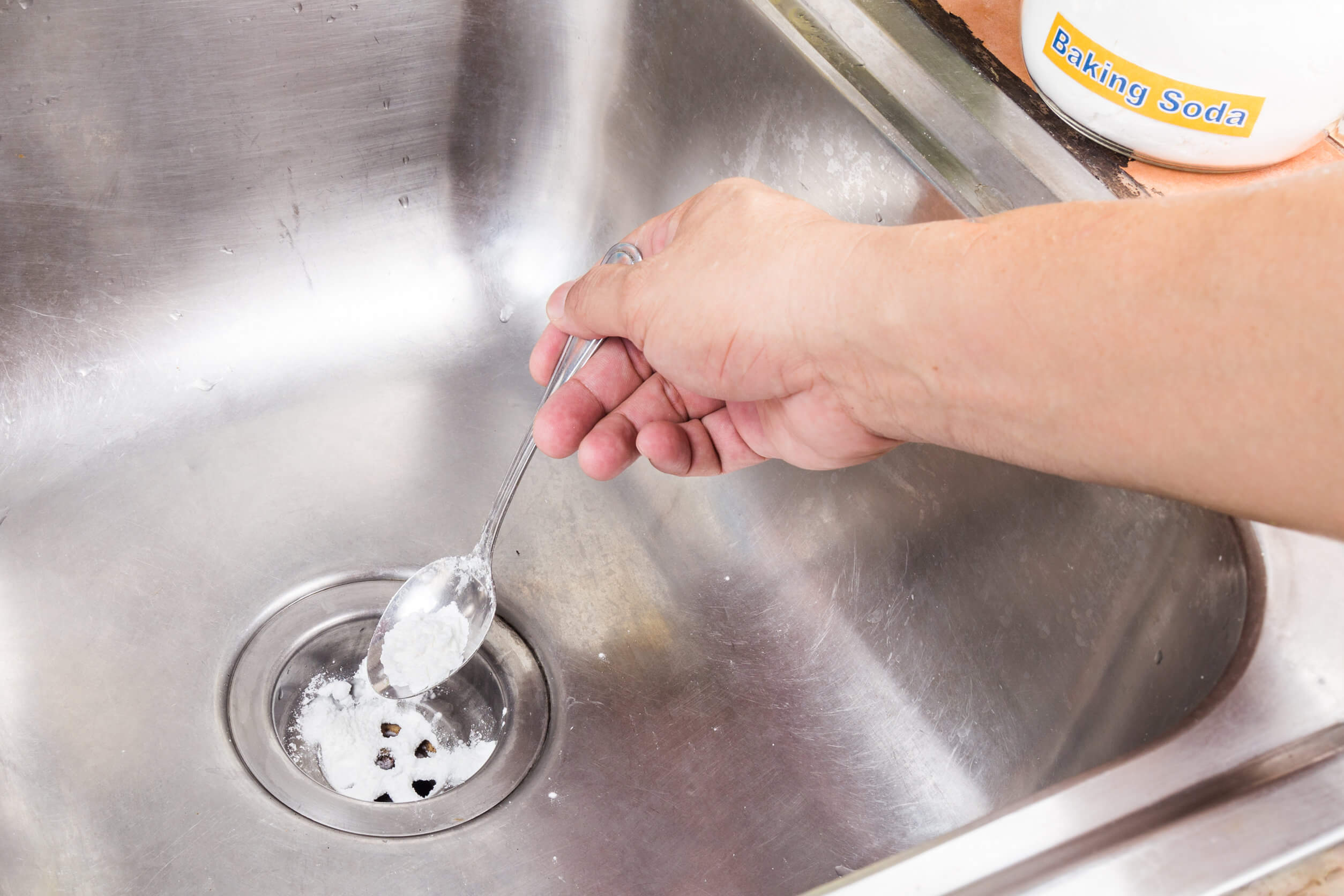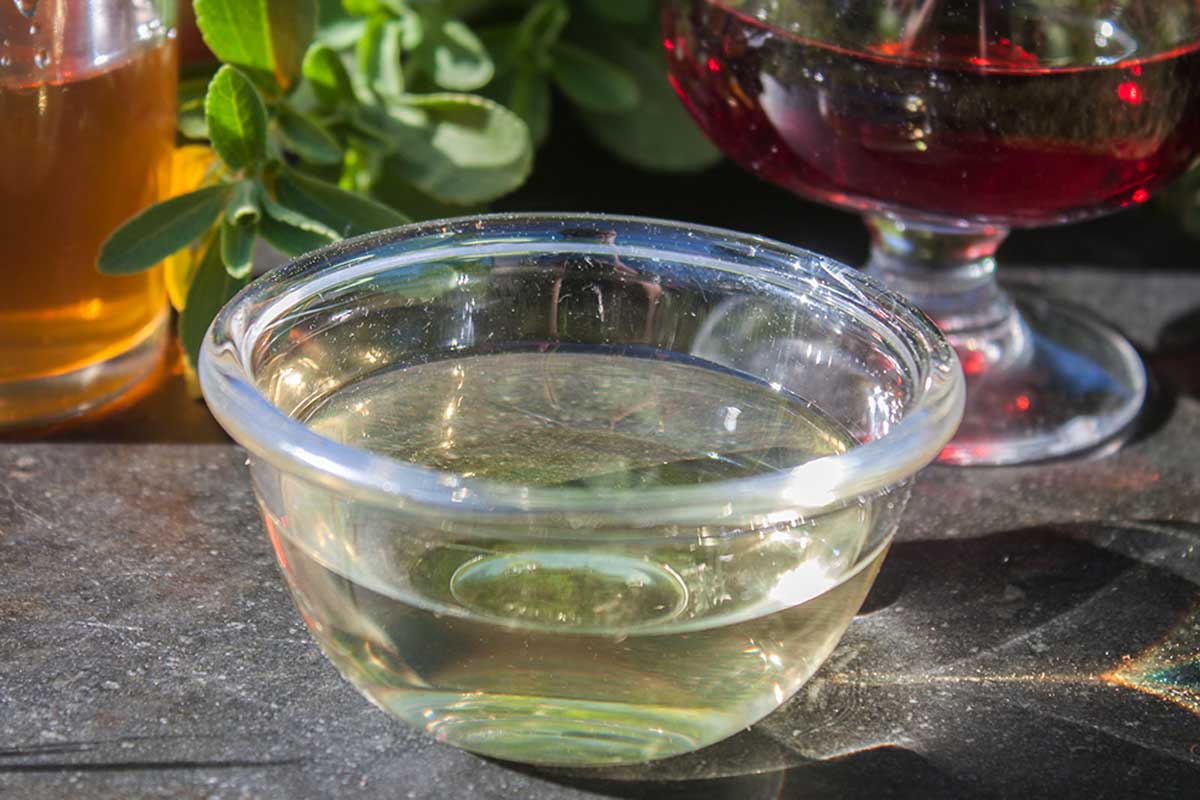Tips For Cleaning Your Kitchen Sink

Cleaning your kitchen sink is an easy job, but one that we don’t generally dedicate the time and attention to do it thoroughly. We forget that leaving food scraps or an incomplete clean can create the perfect environment for harmful bacteria to grow.
Now you’re aware of this risk, you need to start paying more attention to cleaning your kitchen sink. So keep reading because we’re about to share some simple and inexpensive tips that you can put into practice as soon as possible.
The importance of cleaning your sink

According to a study by the University of Barcelona, the kitchen is one of the places in the home that’s most prone to bacterial recontamination. The sink being one of the surfaces that, (within this space) can harbor even more bacteria, due to its constant use and the accumulation of food and water remains.
In fact, other research indicates that the kitchen sink can be 100,000 times more contaminated than the bathroom sink. This, due to its frequent use and contact with food. So much so, that it can be the focus and basis for infection in the rest of the kitchen and the food that’s prepared there. So it’s vital to learn how to clean this area of the kitchen.
Tips for cleaning your kitchen sink
Our tips for cleaning your kitchen sink include using inexpensive, natural products that effectively kill most of the bacteria that accumulate there. Many have antibacterial properties that you can find in any store or that you may even already have at home. Read on to learn how to use them.
Cleaning with mild soap
Cleaning your kitchen sink with mild soap is very simple, but it’s effective in removing traces of grease and food. The only thing you’ll need to do is to dilute some in hot water. Use a brush to scrub the entire surface with this mixture–paying particular attention to the corners, joints, and the plug.
This is where food debris, grease, and bacteria accumulate the most. Then, open the faucet and rinse with plenty of water. Finally, you can polish it with a dry cloth.
Baking soda and lemon

Another tip for cleaning your kitchen sink is to use baking soda. This is a compound that deodorizes and disinfects, which is why it’s widely used in cleaning.
In this specific case, we’re going to mix it with water to remove food and fat remains. Once you have the mixture ready, you’re going to spread it over the entire sink and let it act for 15 minutes. Then, with the help of a brush and plenty of water, you can remove the product.
Use lemon to clean rust-stained areas on your steel sink and faucets, or to polish them. In this way, you’ll not only have a sanitized sink, but also a shiny one.
Vinegar
Every home has a use for vinegar, a substance that is used to dress salads and some gastronomic preparations. However, this time we’re going to use it to disinfect and deodorize your kitchen sink.
There are two easy methods to use it. The first is to dilute a little vinegar in water and spray it over your sink, then use a brush to scrub the surface. Once you finish this step, rinse your sink with plenty of water.
The second method can be put into practice to clean your kitchen sink every day. Dilute a little vinegar in water, soak a cloth and wipe it over the surface. When finished, wash the cloth well to prevent bacteria from growing on it.
Tips for cleaning different types of kitchen sinks

The tips we gave you for cleaning your kitchen sink can be implemented in sinks made of different materials. However, considering that each home is different, we’ll tell you how to clean your kitchen sink according to the material that it’s made of.
Tips for cleaning steel sinks
The steel sink has two characteristics that make it pleasing to look at, the ease with which it can be cleaned and the shine it has. To clean it effectively and prevent bacteria from growing, you can use mild soap with water and vinegar, as described in the previous section.
The only additional recommendation that you should follow is that it’s better to use a soft sponge to apply the products. This will prevent scratches, as can happen with certain types of brushes.
Ceramic kitchen sinks
Ceramic is a very delicate material due to and prone to cracks and damage. For cleaning this type of kitchen sink, we advise that you use bicarbonate or vinegar, as they aren’t abrasive. Choose your preference and scrub each space, then rinse clean with plenty of water.
Remember to use a very soft sponge so as not to dull the ceramic.
Will you follow these tips for cleaning your kitchen sink?
These kitchen sink cleaning tips are simple, inexpensive, and easy to implement. They’ll certainly make it much easier for you to continuously clean this space. In fact, they don’t just work only for the kitchen sink, you can also clean your countertop with them and eliminate bacteria.
Cleaning your kitchen sink is an easy job, but one that we don’t generally dedicate the time and attention to do it thoroughly. We forget that leaving food scraps or an incomplete clean can create the perfect environment for harmful bacteria to grow.
Now you’re aware of this risk, you need to start paying more attention to cleaning your kitchen sink. So keep reading because we’re about to share some simple and inexpensive tips that you can put into practice as soon as possible.
The importance of cleaning your sink

According to a study by the University of Barcelona, the kitchen is one of the places in the home that’s most prone to bacterial recontamination. The sink being one of the surfaces that, (within this space) can harbor even more bacteria, due to its constant use and the accumulation of food and water remains.
In fact, other research indicates that the kitchen sink can be 100,000 times more contaminated than the bathroom sink. This, due to its frequent use and contact with food. So much so, that it can be the focus and basis for infection in the rest of the kitchen and the food that’s prepared there. So it’s vital to learn how to clean this area of the kitchen.
Tips for cleaning your kitchen sink
Our tips for cleaning your kitchen sink include using inexpensive, natural products that effectively kill most of the bacteria that accumulate there. Many have antibacterial properties that you can find in any store or that you may even already have at home. Read on to learn how to use them.
Cleaning with mild soap
Cleaning your kitchen sink with mild soap is very simple, but it’s effective in removing traces of grease and food. The only thing you’ll need to do is to dilute some in hot water. Use a brush to scrub the entire surface with this mixture–paying particular attention to the corners, joints, and the plug.
This is where food debris, grease, and bacteria accumulate the most. Then, open the faucet and rinse with plenty of water. Finally, you can polish it with a dry cloth.
Baking soda and lemon

Another tip for cleaning your kitchen sink is to use baking soda. This is a compound that deodorizes and disinfects, which is why it’s widely used in cleaning.
In this specific case, we’re going to mix it with water to remove food and fat remains. Once you have the mixture ready, you’re going to spread it over the entire sink and let it act for 15 minutes. Then, with the help of a brush and plenty of water, you can remove the product.
Use lemon to clean rust-stained areas on your steel sink and faucets, or to polish them. In this way, you’ll not only have a sanitized sink, but also a shiny one.
Vinegar
Every home has a use for vinegar, a substance that is used to dress salads and some gastronomic preparations. However, this time we’re going to use it to disinfect and deodorize your kitchen sink.
There are two easy methods to use it. The first is to dilute a little vinegar in water and spray it over your sink, then use a brush to scrub the surface. Once you finish this step, rinse your sink with plenty of water.
The second method can be put into practice to clean your kitchen sink every day. Dilute a little vinegar in water, soak a cloth and wipe it over the surface. When finished, wash the cloth well to prevent bacteria from growing on it.
Tips for cleaning different types of kitchen sinks

The tips we gave you for cleaning your kitchen sink can be implemented in sinks made of different materials. However, considering that each home is different, we’ll tell you how to clean your kitchen sink according to the material that it’s made of.
Tips for cleaning steel sinks
The steel sink has two characteristics that make it pleasing to look at, the ease with which it can be cleaned and the shine it has. To clean it effectively and prevent bacteria from growing, you can use mild soap with water and vinegar, as described in the previous section.
The only additional recommendation that you should follow is that it’s better to use a soft sponge to apply the products. This will prevent scratches, as can happen with certain types of brushes.
Ceramic kitchen sinks
Ceramic is a very delicate material due to and prone to cracks and damage. For cleaning this type of kitchen sink, we advise that you use bicarbonate or vinegar, as they aren’t abrasive. Choose your preference and scrub each space, then rinse clean with plenty of water.
Remember to use a very soft sponge so as not to dull the ceramic.
Will you follow these tips for cleaning your kitchen sink?
These kitchen sink cleaning tips are simple, inexpensive, and easy to implement. They’ll certainly make it much easier for you to continuously clean this space. In fact, they don’t just work only for the kitchen sink, you can also clean your countertop with them and eliminate bacteria.
All cited sources were thoroughly reviewed by our team to ensure their quality, reliability, currency, and validity. The bibliography of this article was considered reliable and of academic or scientific accuracy.
- Ríos Castillo, A. G. (2013). Evaluación del nivel de contaminación de superficies y la eficacia de productos desinfectantes a corto y largo plazo. Universidad autónoma de Barcelona.
- Zárate, Noemí, Cowan, Clyde, Román, Christian, & Lombardo, Gonzalo. (2020). Contaminación bacteriana de esponja de lavado y bachas de cocina de Cantinas de Escuelas de Asunción y Gran Asunción. Pediatría (Asunción), 47(2), 94-99. Epub August 00, 2020
- Moro, A. Las increíbles propiedades del bicarbonato de sodio. 2009.







